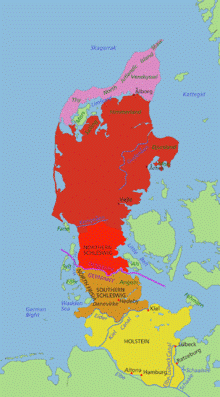
Jutland peninsula
Jutes
The Jutes, Iuti, or Iutæ were a Germanic people who, according to Bede, were one of the three most powerful Germanic peoples of their time, the other two being the Saxons and the Angles. They are believed to have originated from Jutland (called Iutum in Latin) in modern Denmark, Southern Schleswig (South Jutland) and part of the East Frisian coast.
Bede places the homeland of the Jutes on the other side of the Angles relative to the Saxons, which would mean the northern part of the Jutland Peninsula. Tacitus portrays a people called the Eudoses living in the north of Jutland and these may have been the later Iutae. The Jutes have also been identified with the Eotenas (ēotenas) involved in the Frisian conflict with the Danes.
Disagreeing with Bede, some historians identify the Jutes with people called the Eucii (or Saxones Eucii) who were evidently associated with the Saxons and dependents of the Franks in 536. The Eucii may have been identical with an obscure tribe called the Euthiones and probably associated with the Saxons. Even if Jutes were present to the south of the Saxons in the Rhineland or near the Frisians, this does not contradict the possibility that they were migrants from Jutland.
The Jutes, along with some Angles, Saxons and Frisians, sailed across the North Sea to raid and eventually invade Great Britain from the late 4th century onwards, either displacing, absorbing, or destroying the native Celtic peoples there. According to Bede, they finally settled in Kent (where they became known as the Cantuarii), Hampshire (in Wessex), and the Isle of Wight (where they became known as the Uictuarii).

Jutish settlements in Britain c. 575
The culture of the Jutes of Kent shows more signs of Roman, Frankish, and Christian influence than that of the Angles or Saxons. Funerary evidence indicates that the pagan practice of cremation ceased relatively early and jewellery recovered from graves has affinities with Rhenish styles from the Continent, perhaps suggesting close commercial connections with Francia. The Jutish king Ethelbert of Kent married the Frankish princess Bertha and introduced Christianity into parts of Britain. He was the only Jutish Bretwalda.